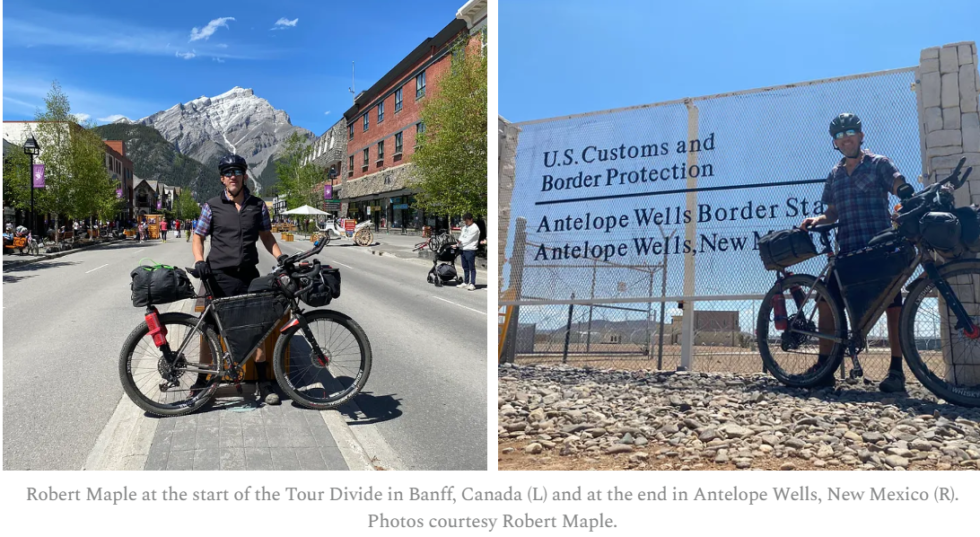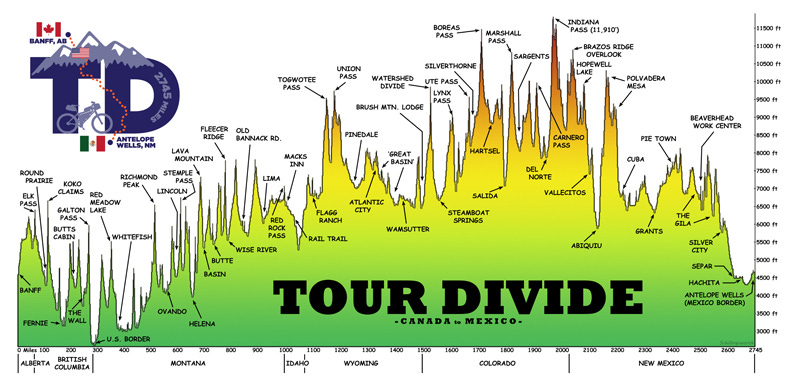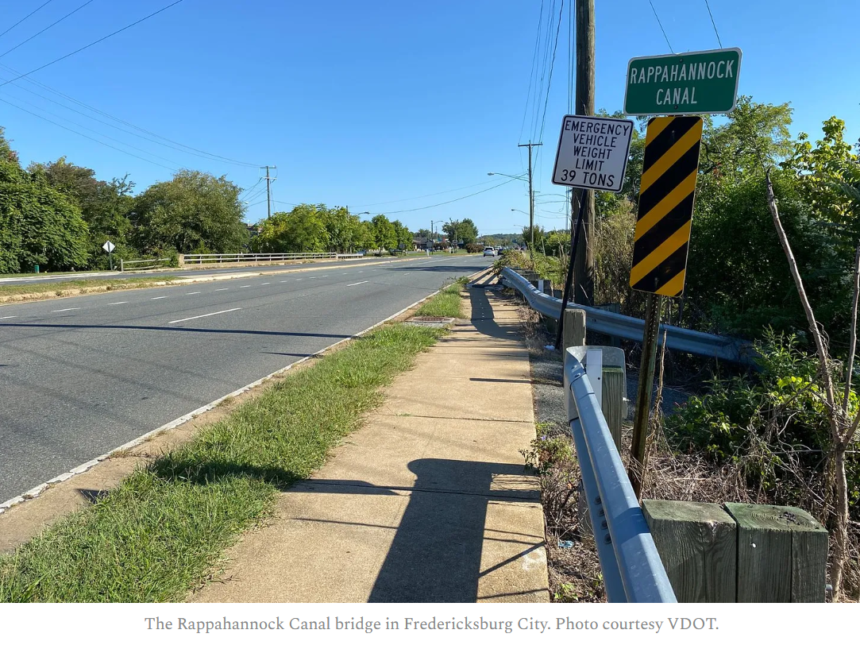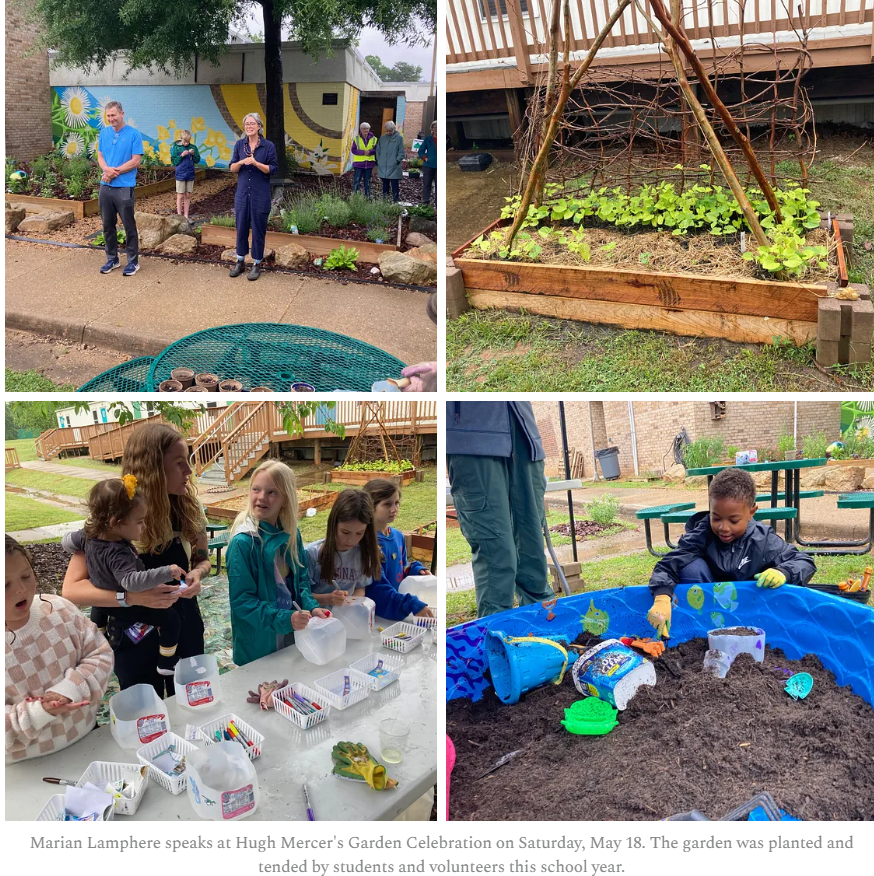
Fredericksburg-area resident completes this year’s Tour Divide, an ultra-distance, unsupported annual mountain bike race.
At the bottom of a jolting, seven-mile descent into the area of Steamboat Springs, Colorado, Robert Maple realized he’d lost his tent poles.
The Spotsylvania resident was days into his attempt to finish the Tour Divide—the world’s longest annual off-pavement cycling race, which traverses the length of the Rocky Mountains from Banff, Canada to Antelope Wells, New Mexico.
“It was the craziest seven-mile descent. I’m on a 70-pound bike riding a jeep trail with no suspension,” Maple recalled. “I get to the bottom and all my bags are loose, and while I’m tightening everything, I realize I lost my tent poles.”
There’s little civilization along the course of the Tour Divide. Maple was camping in true wilderness most nights and his Big Agnes tent was his home. Without the tent poles, he’d have no protection from weather (which dumped freezing rain and snow on him in June) or wildlife (June is grizzly bear breeding season).
“I was panicking,” Maple said.
He pulled out his cell phone to look up the nearest Big Agnes retail location. If he couldn’t get to one on his bike, he might not be able to finish the race.
“Guess where the headquarters is? Steamboat Springs. I had lost my poles 10 miles outside town, and there was a store opening at 9 a.m. the next day,” Maple said.
By 9:30 a.m. the next morning, Maple was on his way with brand-new poles, which he’d been given free of charge.
“You hear about ‘trail magic,’” said Maple, who’s had a 29-year career in the Army both as an active duty servicemember and as a civilian. “I experienced it many times, but that was the best.”
Maple completed all 2,745 miles of the Tour Divide in 29 days, four hours, and 46 minutes. He climbed 181,000 feet of elevation and crossed through two Canadian provinces and five U.S. states, putting in 15-hour days on his bike and carrying all gear and supplies with him.

This year, Maple said, 226 “crazy people” started the race from Banff, Alberta, Canada, at 8 a.m. on June 14.
Of those, just 119 finished.
“There’s usually, from what I understand, a 50% attrition rate, due to mechanical issues and also medical issues,” Maple said.
Of the finishers, about 15-25 deviated from the official course, he said. Riders also have to follow the prescribed course in order to be considered finishers.
The Tour Divide is an unsupported race, meaning that riders are not allowed to receive assistance from family or friends and must purchase food and supplies from commercial sources.
“My goal was to be as unsupported as possible and to not deviate to the route—which I did not,” Maple said.
Because it’s unsupported, the Tour Divide poses a mental as well as a physical challenge.
“This is bad math, but I’d say it’s about 80% physical and 90% mental,” Maple said. He’d carry about two days-worth of food and water with him and would make a plan for where he’d next be able to get food and water—but fickle mountain weather and unpredictable terrain often meant he wasn’t able to get where he needed to be when he needed to get there.
“There’d be places where I thought I would be able to get water, but I’d get there and the creek crossings were dry,” Maple said. “So, there’s the mental anguish of having to start conserving water and food.”
“In Wyoming, there was a 186-mile stretch that had one water source—a cow trough,” he continued. “For most of those two days, there were no trees, just rolling grassland and the wind was like 30 mph. I’m peddling as hard as I can but it’s into a headwind and I’m only moving a couple miles per hour.”

At another point, he ran out of food and had to make a turkey wrap and a Snickers bar last for an entire day, taking one bite of each per hour.
But always, Maple said, “trail magic” was there to help him. He’d round a bend, and someone would be there with a Coke to share, or he’d pull into a campground (he only stayed in campgrounds four out of 24 nights) to find that the person leaving had several gallons of water left over.
The Tour Divide has no entry fee and no sponsors, and there are no prizes for the finishers. Maple said he doesn’t have a clearly defined reason for wanting to complete the race, other than a love of “bikepacking”—mixing all-terrain biking and backpacking.
But once he started, he found that his motivation to finish the race was to not let down everyone who’d helped him get to the race—his supervisors at Fort Walker, who granted his request for an “unprecedented in American culture” five weeks of leave; medical professionals who helped him rehab after he broke his wrist and tore a tendon in his thumb seven months before the Tour Divide; the Fredericksburg-area mountain biking community; and his family.
And as he’s continued to unpack the experience, he’s come up with a takeaway.
“I’ve always been really ‘go go go’ and this was an opportunity to say, ‘Wait, life is short, and we’re not promised tomorrow,’” Maple said.
It was a chance to step outside himself and see how he fit into the natural world.
“I was in places there was literally, physically nobody. I’m a little dot in the middle of this giant landscape,” he said. “I’ve never really experienced being that dot.”
Maple hopes his “epic adventure” inspires others and he’s honored to have represented the Fredericksburg area among the Tour Divide finishers.
“Only 50% of those who entered this year were Americans, and only two were from Virginia,” he said. “Those are small statistics that I’m proud to be part of. And I credit what we have here [in Fredericksburg] for preparing me for that.”

Submit a Recipe for Publication
Follow us on Facebook | Instagram | Youtube

Local Obituaries
To view local obituaries or to send a note to family and loved ones, please visit our website at the link that follows.

Support Award-winning, Locally Focused Journalism

The FXBG Advance cuts through the talking points to deliver both incisive and informative news about the issues, people, and organizations that daily affect your life. And we do it in a multi-partisan format that has no equal in this region. Over the past month, our reporting was:
$8 a month supports great journalism
- First to report on a Spotsylvania School teacher arrested for bringing drugs onto campus.
- First to report on new facility fees leveled by MWHC on patient bills.
- First to detail controversial traffic numbers submitted by Stafford staff on the Buc-ee’s project
- Provided extensive coverage of the cellphone bans that are sweeping local school districts.
- And so much more, like Clay Jones, Drew Gallagher, Hank Silverberg, and more.
For just $8 a month, you can help support top-flight journalism that puts people over policies.
Your contributions 100% support our journalists.
Help us as we continue to grow!





